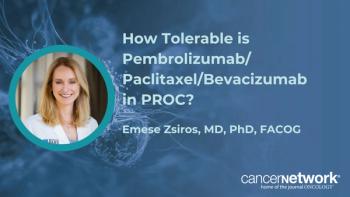
Salma Jabbour, MD, on the Results of the Ongoing KEYNOTE-799 Study
The chief of Gastrointestinal Radiation Oncology at the Rutgers Cancer Institute of New Jersey discussed updated results from the study of pembrolizumab plus concurrent chemoradiation therapy in patients with unresectable, locally advanced, stage III non–small cell lung cancer.
Results from the ongoing KEYNOTE-799 study (NCT03631784) presented at the IASLC 2020 World Conference on Lung Cancer (WCLC) Singapore showed promise for the use of pembrolizumab (Keytruda) plus concurrent chemoradiation therapy in patients with unresectable, locally advanced, stage III non–small cell lung cancer (NSCLC).
With approximately 15 weeks of follow-up, previous interim results demonstrated an overall response rate (ORR) of 67.0% in cohort A, which contained patients with both squamous and nonsquamous NSCLC, and 56.6% in cohort B, which consisted of only patients with nonsquamous NSCLC.
In an interview with CancerNetwork®, Salma Jabbour, MD, chief of Gastrointestinal Radiation Oncology at the Rutgers Cancer Institute of New Jersey, discussed the updated results presented at WCLC which reported data with an additional 6 months of follow-up.
Transcription:
The 1-year PFS [rate] in cohort A was about 67%. And in cohort B, the 1-year PFS [rate] was about 65%. The objective response rate was about 70% in both groups with a duration of response which was not yet reached. In addition, the 1-year overall survival was over 80% in both cohort[s] A and B. Overall, the results were very promising for this study.
Reference:
Reck M, Lee KH, Frost N, et al. Pembrolizumab plus platinum chemotherapy and radiotherapy in unresectable, locally advanced, stage III NSCLC: KEYNOTE-799. Presented at the IASLC 2020 World Conference on Lung Cancer Singapore. Abstract OA02.03.
Newsletter
Stay up to date on recent advances in the multidisciplinary approach to cancer.










































